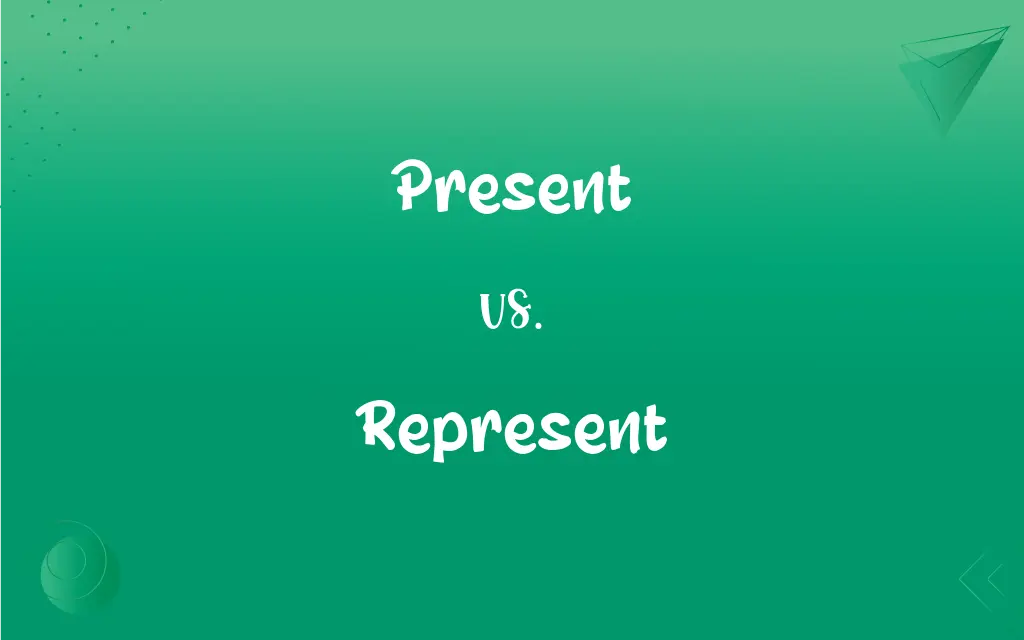Present vs. Represent: What's the Difference?
Edited by Harlon Moss || By Janet White || Updated on October 19, 2023
"Present" typically means to display or give something, while "represent" implies acting on behalf of someone or symbolizing something. Both involve introducing or standing in for an idea or entity.

Key Differences
"Present" is a versatile word in English, functioning as both a verb and an adjective, among other uses. As a verb, it might mean to formally introduce or display something for others to see. "Represent," however, carries the connotation of standing in for someone else, either as their proxy or symbolically embodying an idea or principle. Both words, in their various contexts, touch upon the act of introduction or display, but represent extends this to the realm of symbolism and agency.
In another sense, "present" can also describe the here and now, as in referring to current events or times. It's about what's immediate and occurring at the moment. "Represent," in contrast, stretches beyond the immediate to encompass the act of reflecting historical events, abstract ideas, or future promises through a person, figure, or concept. While present is rooted in the current, represent transcends timeframes, linking the past, present, or future to the moment of portrayal.
"Present" can also imply a gift given to someone, often in a formal or ceremonial context. It's about the act of giving and receiving in the physical or metaphorical sense. "Represent" doesn't share this meaning of exchange; rather, it's about embodying, mirroring, or acting on behalf of something else. It's a display not of an object or immediate concept, but of a broader idea, entity, or set of values.
In grammatical terms, "present" can refer to the present tense, describing actions that are happening now or general truths. The word’s versatility is evident in its role in indicating time in language. "Represent," however, remains firmly a verb, its purpose to indicate the action of serving as a symbol or substitute for something else. It's about portrayal and reflection, not immediacy or timing.
In the realm of law, to "present" can mean to submit something, like evidence or a document, formally to an authority. It's the official act of putting something forward for consideration. "Represent," in legal terms, involves acting on behalf of another—usually a client or a legal entity—in an official capacity, such as in a court of law or negotiation. While both can occur in formal settings, represent involves agency on behalf of another, whereas present is the act of submission without the necessity of agency.
ADVERTISEMENT
Comparison Chart
Parts of speech
Used as a verb, noun, adjective, and more.
Primarily used as a verb.
Tenses
Present can denote the current tense in grammar.
Represent does not have a specific grammatical tense.
Grammatical role
Can be the subject or object of a sentence.
Typically functions as a verb in a sentence.
Adjective form
Present (existing or occurring now)
Representative (serving to represent)
Conjugation
Presents, Presenting, Presented
Represents, Representing, Represented
ADVERTISEMENT
Present and Represent Definitions
Present
Being, existing, or occurring at this time or now; current.
The present situation has become quite challenging.
Represent
To serve as a delegate or agent for another.
The lawyer will represent the defendant in court.
Present
To give or award formally or ceremonially.
The CEO will present the award to the employee of the year.
Represent
To symbolize or stand for something.
In literature, a journey often represents personal growth.
Present
A gift or something given to someone.
My aunt gave me a book as a present for my birthday.
Represent
To be an example or equivalent of something.
One lap around the track represents a quarter of a mile.
Present
To introduce (a person) to another person or group.
Let me present my daughter, Emma, who just graduated from college.
Represent
To act as a substitute or stand-in for something.
The understudy will represent the lead actor tonight.
Present
To show or offer for others to view.
She will present her research at the conference.
Represent
To have as a meaning, suggestion, or association; stand for or symbolize
The rose represents beauty. The bald eagle represents the United States.
Represent
To indicate or communicate by signs or symbols
Letters of the alphabet represent sounds.
Represent
To depict in art; portray
The painting represents a woman wearing a hat.
Represent
To describe or present in words; set forth
The article represents the shortcomings of our school system in some detail.
Represent
To act the part or role of
Represented the villain in the story.
Represent
To present clearly to the mind
How are sense data represented to the mind?.
Represent
To draw attention to by way of remonstrance or protest
Our parents represented to us the need for greater caution.
Represent
To describe or put forward (a person or thing) as an embodiment of a specified quality
Tried to represent his opponent as untrustworthy.
Represent
To serve as a delegate or agent for
She represents a district that is very concerned about high rents.
Represent
To act as a spokesperson for.
Represent
To be an example or examples of
The museum had several paintings representing the artist's early style.
Represent
To be the equivalent of; amount to
The money in the bank represents the better part of their life savings.
Represent
(transitive) To present again or anew; to present by means of something standing in the place of; to exhibit the counterpart or image of; to typify.
Represent
(transitive) To portray visually; to delineate
A landscape can be represented in a picture.
The sculptor represented a horse in bronze.
Represent
(transitive) To portray by mimicry or acting; to act the part or character of
It has always been his dream to represent Hamlet on Broadway.
Represent
(transitive) To stand or act in the place of; to perform the duties, exercise the rights, or otherwise act on behalf of
He sent his agent to represent himself at the meeting.
As he was too ill to accept the award, his brother represented him at the ceremony.
An attorney's job is to represent his client in court
Represent
To act as a representative of (a country, state, district etc.)
They chose a member of Congress to represent their district.
Represent
(transitive) To portray to another using language; to show; to give one's own impressions and judgement of
He represented that he was investigating for the police department.
Represent
(transitive) To give an account of; to describe.
Represent
(transitive) To serve as a sign or symbol of
The @ symbol represents the online world.
A dove is often used to represent peace.
Represent
(transitive) To bring a certain sensation of into the mind; to cause to be known, felt, or apprehended; to present.
Represent
(transitive) To form or image again in consciousness, as an object of cognition or apprehension (something presentative, which was originally apprehended by direct presentation).
Represent
(transitive) To constitute, to make up, to be an example of.
Represent
To participate as a team member
Represent
To constitute a good example or symbol of a group of people; to acquit oneself well.
Represent
(medicine) To present again, for instance for medical attention.
Represented to the emergency department
Represent
To present again or anew; to present by means of something standing in the place of; to exhibit the counterpart or image of; to typify.
Before him burnSeven lamps, as in a zodiac representingThe heavenly fires.
Represent
To portray by pictoral or plastic art; to delineate; as, to represent a landscape in a picture, a horse in bronze, and the like.
Represent
To portray by mimicry or action of any kind; to act the part or character of; to personate; as, to represent Hamlet.
Represent
To stand in the place of; to supply the place, perform the duties, exercise the rights, or receive the share, of; to speak and act with authority in behalf of; to act the part of (another); as, an heir represents his ancestor; an attorney represents his client in court; a member of Congress represents his district in Congress.
Represent
To exhibit to another mind in language; to show; to give one's own impressions and judgement of; to bring before the mind; to set forth; sometimes, to give an account of; to describe.
He represented Rizzio's credit with the queen to be the chief and only obstacle to his success in that demand.
This bank is thought the greatest load on the Genoese, and the managers of it have been represented as a second kind of senate.
Represent
To serve as a sign or symbol of; as, mathematical symbols represent quantities or relations; words represent ideas or things.
Represent
To bring a sensation of into the mind or sensorium; to cause to be known, felt, or apprehended; to present.
Among these. Fancy nextHer office holds; of all external thingsWhich he five watchful senses represent,She forms imaginations, aery shapes.
Represent
To form or image again in consciousness, as an object of cognition or apprehension (something which was originally apprehended by direct presentation). See Presentative, 3.
The general capability of knowledge necessarily requires that, besides the power of evoking out of unconsciousness one portion of our retained knowledge in preference to another, we posses the faculty of representing in consciousness what is thus evoked . . . This representative Faculty is Imagination or Phantasy.
Represent
Take the place of or be parallel or equivalent to;
Because of the sound changes in the course of history, an 'h' in Greek stands for an 's' in Latin
Represent
Express indirectly by an image, form, or model; be a symbol;
What does the Statue of Liberty symbolize?
Represent
Be representative or typical for;
This period is represented by Beethoven
Represent
Be a delegate or spokesperson for; represent somebody's interest or be a proxy or substitute for, as of politicians and office holders representing their constituents, or of a tenant representing other tenants in a housing dispute;
I represent the silent majority
This actor is a spokesperson for the National Rifle Association
Represent
Serve as a means of expressing something;
The flower represents a young girl
Represent
Be characteristic of;
This compositional style is exemplified by this fugue
Represent
Form or compose;
This money is my only income
The stone wall was the backdrop for the performance
These constitute my entire belonging
The children made up the chorus
This sum represents my entire income for a year
These few men comprise his entire army
Represent
Be the defense counsel for someone in a trial;
Ms. Smith will represent the defendant
Represent
Create an image or likeness of;
The painter represented his wife as a young girl
Represent
Play a role or part;
Gielgud played Hamlet
She wants to act Lady Macbeth, but she is too young for the role
She played the servant to her husband's master
Represent
Perform (a play), especially on a stage;
We are going to stage `Othello'
Represent
Describe or present, usually with respect to a particular quality;
He represented this book as an example of the Russian 19th century novel
Represent
Point out or draw attention to in protest or remonstrance;
Our parents represented to us the need for more caution
Represent
Bring forward and present to the mind;
We presented the arguments to him
We cannot represent this knowledge to our formal reason
Represent
To establish a mapping (of mathematical elements or sets)
Represent
To describe or depict something in a particular way.
The article represents the situation as worse than it is.
FAQs
Does "present" only refer to the current time?
No, "present" can also mean to display, introduce, or give something.
Can "present" and "represent" be used interchangeably?
No, "present" involves displaying or giving, while "represent" involves symbolizing or acting on behalf of.
Is "represent" always about people?
No, it can also refer to symbolizing ideas, states, or actions.
Does "present" have a tense?
Yes, it's used in grammar to denote the present tense.
Does "present" imply formality?
Often, especially when referring to ceremonial or official contexts.
Does "represent" imply accuracy in depiction?
Not always; something can be represented accurately or inaccurately.
Can "present" refer to a gift?
Yes, "present" can be a noun meaning a gift or something given.
Can an object "represent" something?
Yes, objects can symbolize ideas, values, or other entities.
Is "present" used in legal contexts?
Yes, it can mean to formally submit something like evidence.
Can animals "represent" things?
In literature and art, animals can symbolize various qualities or concepts.
Can a color "represent" an emotion?
Yes, colors are often used symbolically to represent emotions or moods.
Can you "represent" yourself?
Yes, in certain contexts like legal, individuals can represent themselves.
Does "represent" involve responsibility?
Typically, yes, especially in legal, artistic, or diplomatic contexts.
Is "represent" active or passive?
It's active; it involves the action of depicting or standing in for.
Does "represent" require authorization?
Often, especially when one is representing another person or entity.
Can "present" mean "to deliver"?
Yes, it can mean to deliver something for consideration or review.
Is "present" subjective or objective?
It can be either, depending on the context.
Can "present" be an adjective?
Yes, it can describe something occurring now or in a specific place.
Is "present" tangible?
Not always; it can refer to abstract presentations like ideas.
Can abstract concepts "represent"?
Yes, they can symbolize or indicate broader ideas or themes.
About Author
Written by
Janet WhiteJanet White has been an esteemed writer and blogger for Difference Wiki. Holding a Master's degree in Science and Medical Journalism from the prestigious Boston University, she has consistently demonstrated her expertise and passion for her field. When she's not immersed in her work, Janet relishes her time exercising, delving into a good book, and cherishing moments with friends and family.
Edited by
Harlon MossHarlon is a seasoned quality moderator and accomplished content writer for Difference Wiki. An alumnus of the prestigious University of California, he earned his degree in Computer Science. Leveraging his academic background, Harlon brings a meticulous and informed perspective to his work, ensuring content accuracy and excellence.































































